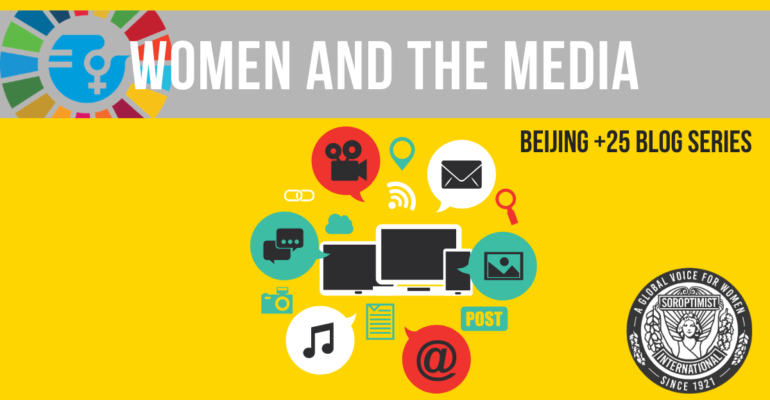As part of a series of blogs on the Beijing Declaration and Platform for Action, SI Advocacy Coordinator, Hannah Agius, discusses the subject of women and the media.
“Twenty-five years ago, when the Beijing Declaration and Platform for Action was written, the term ‘’media’’ meant something different to what it means today. With the revolution of the internet, many of us engage with a myriad of media feeds, accessible at all times of day and night, which permeate every aspect of our professional and personal lives. This has tremendous implications for the representation and lived experience of women’s rights. The two aspects to consider when discussing women in the media are: equality between women and men working in the media, and equality in representations of women and men by the media. Often, these two categories feed into one another, and are both equally important to review.
Undoubtedly, the media has the capacity to facilitate the advancement of women and girls but too often it is weaponised to intimidate and silence women, perpetuate harmful stereotypes and ultimately, to reduce the progression towards gender equality.
“Stereotypes can serve as the basis for escalating acts of bias and discrimination and ultimately lead to bias-motivated violence.”*
Hate speech, smear campaigns, threats, and incitement of violence are frequently impacting women’s involvement in public life, leadership roles, and journalism. The growing culture of online trolling through social media platforms is fuelling acts of violence against women journalists, human rights defenders, and politicians. The growing tide of abuse preludes the existence of adequate legislation to protect individuals from harm or to prosecute perpetrators. The regulation of online abuse hinges on the balance between the need to protect freedom of speech, whilst ensuring protection from hate speech and acts of violence. Another issue is the ability of online trolls to transcend international borders in a way that legislative frameworks have yet to adequately master, leaving many women in the media with a choice between enduring ongoing abuse, or withdrawing from their position. This requires a multilateral approach to media policies and legislation, including the legal recognition of misogynistic acts as hate crimes.
The International Federation of Journalists (IFJ) has found that 70% of women working in media feel that their organisations are not taking action to protect their security or safety. As a result, the IFJ has reported that 38 % of women journalists admitted self-censorship following online abuse. This cannot continue, the world needs women’s free and equal participation in the media. Despite more women being in the communications sector, few hold positions at the decision-making level or serve on the governing bodies that influence media policy. The political declaration from the first five year review of the Beijing Platform for Action called for media networks to “develop, consistent with freedom of expression, regulatory mechanisms, including voluntary ones, that promote balanced and diverse portrayals of women by the media and international communication systems and that promote increased participation by women and men in production and decision-making”. Frustratingly, twenty years later, this is far from achieved.
The European Institute for Gender Equality (EIGE) has urged Member States to “collaborate with regulatory authorities to develop guidance for online platforms on harmful content that exceeds the level of acceptability and is likely to require regulation or removal, {and} extend the monitoring role, scope and powers of broadcasting and press councils with regard to gender equality in the media industry and consider adopting new indicators for monitoring purposes.”** The EIGE recommends the use of the ‘UNESCO Gender Sensitive Indicators for the Media’ as a starting point. More data is necessary to facilitate an accurate assessment of the extent and effect of women’s participation and representation in the media. Without comparable data, reliably measuring the effectiveness of current and potential policies and regulations becomes problematic. Lack of adequate data also prevents accountability and hinders future progress towards women’s equality in the media.
As Soroptimists, it is important that we advocate for the rights of women in the media. We can do this at the local level by supporting women journalists online, advocating for an increase in leadership training schemes for women in journalism, and lobbying media platforms and local schools to encourage the provision of educational programmes about online rights and how to recognise and report abuse.”
*Beijing +25 policy brief: Area J – Women and the media: harmful stereotypes persist.
**ibid
For access to more blogs from this series Visit: https://www.soroptimistinternational.org/tag/beijing25/

